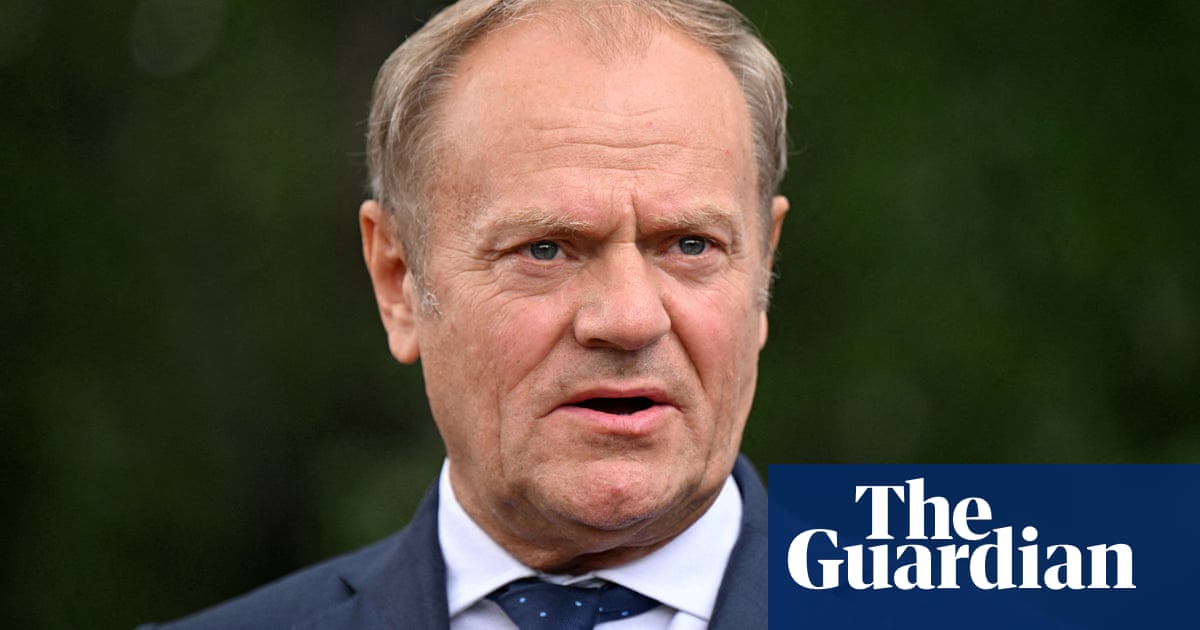Donald Tusk says he will call a vote of confidence in his government to try to shore up support for his coalition after a bruising setback in Poland’s presidential election.
In his first public comments sinceSunday’s election result was declared, the prime minister sought to regain momentum as he promised to “get to work” and submit a number of draft laws.
Congratulating the supporters of the rightwing opposition candidate, Karol Nawrocki, on his win, Tusk said late on Monday the government had a “contingency plan” and vowed to “not stop even for a moment” and double down on his legislative agenda.
In a televised prime-time statement, he said he wanted “everyone, including our opponents at home and abroad, to see … we understand the gravity of the moment, but will not back down a single step”. He said he would seek a parliamentary vote to confirm his majority.
The dramatic move highlights the government’s difficult position as it comes to terms with the consequences of losing the race for the presidency.
Tusk leads an ideologically diverse and politically fragile alliance of pro-European parties, from agrarian right to social democratic left, which promised to reverse the erosion of democratic checks and balances that had marked the eight-year rule of the Law and Justice party (PiS).
After 18 months of difficult cohabitation with the outgoing president and PiS ally, Andrzej Duda, the government had hoped Rafał Trzaskowski, a pro-European Warsaw mayor, would win the election and lift the threat of a presidential veto on progressive legislation.
But Sunday’s defeat will make it very difficult for the government to deliver on its promises, extending the political stalemate.
Nawrocki, who received public backing from senior members of the Trump administration, is fiercely critical of the EU and likely to ally himself wherever he can with other Eurosceptic leaders such as Hungary’s Viktor Orbán. This risks divisions within the bloc at a time when it faces challenges including US tariffs and the war in Ukraine.
While the role of president is largely ceremonial, with some influence over foreign and defence policy, it carries the critical power to veto laws, which can be overturned only with a 60% majority in parliament, which Tusk’s coalition does not have.
No date for the vote of confidence has been set, but it could take place as early as this week because parliament is scheduled to sit on Tuesday and Wednesday. Unless there is a rebellion, the ruling coalition has enough votes in parliament to win.
A clear win would also quash any talk about a potential alternative majority emerging on the right should some government MPs defect to the opposition camp.
Sign up toHeadlines Europe
A digest of the morning's main headlines from the Europe edition emailed direct to you every week day
after newsletter promotion
Speaking just minutes before Tusk, the PiS leader and former prime minister Jarosław Kaczyński argued the election result amounted to “a red card” for the government, urging the prime minister to resign.
In a thinly veiled invitation to other parties to explore an alternative majority, he called for a “technical government” to replace the current administration, conceding that it could even be led by a prime minister who “would not necessarily have any ties to us”.
Seeking to undermine the coalition, he stressed the government could enjoy friendly relations with the new president and could “restore calm in Poland, ease tensions, and improve the situation across all key areas of our social life”.
On Sunday, a senior PiS lawmaker, Przemysław Czarnek, suggested his party could soon start trying to pick off members of Tusk’s broad and already fractured coalition, with the aim of creating a rightwing majority in parliament.
“I can reassure you that maybe not starting tomorrow, but from Tuesday, we will begin very energetic work in order to give the Polish people another gift – the end of Tusk’s government,” Czarnek said.
